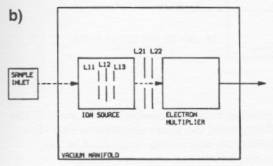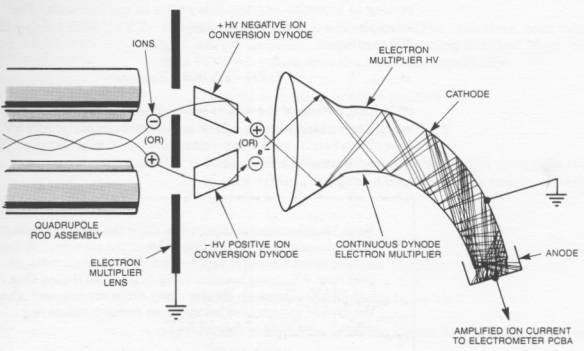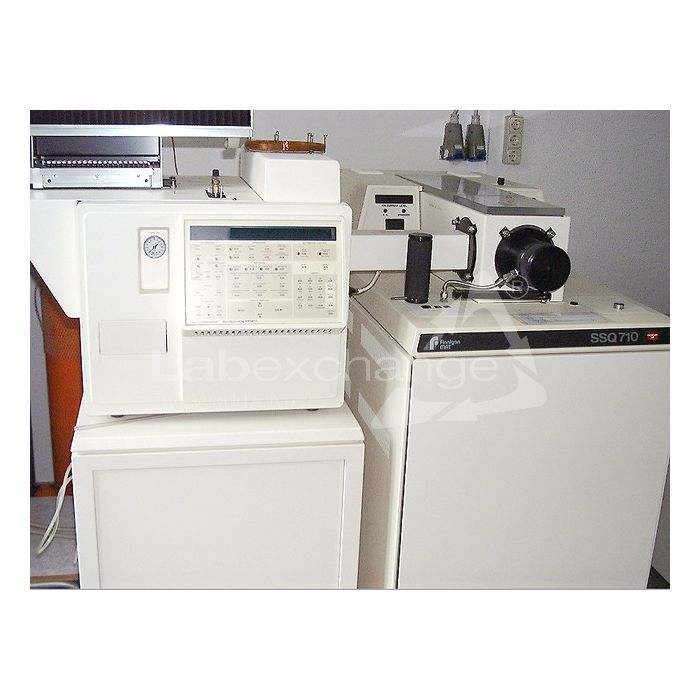Finnigan SSQ 710
| Objektnummer | B00008797 |
|---|---|
| Numéro d'identification | 008797 |
| Nom de l'objet | Finnigan SSQ 710 |
| Statut | Stock unit |
Groupe de produits: CG / MS
Statut, conditions de livraison et de paiement
Vérification des appareils
Les appareils d’occasion sont vérifiés par Labexchange Service GmbH avant la livraison. Vous recevez des appareils entièrement fonctionnels.
Délai d'expédition
Les délais de livraison indiqués sont les plus rapides pour l’article en cause. Les délais de fait peuvent varier au cas par cas. Les délais de livraison définitifs sont indiqués dans la confirmation de commande.
Nous offrons des livraisons collectives par principe. Le délai de livraison s’oriente à l’article avec le délai de livraison le plus long. Une livraison partielle est possible par prix additionnel.
Méthodes d'expédition
Courrier, agences d'expédition, autocueillette, livraison par flotte de Labexchange
Conditions de livraison
Prix plus frais d’expédition. Les frais d’expédition indiqués sont à prévoir. Dérogations éventuelles sont possibles.
Si les coûts de transport ne sont pas spécifiés, s'il vous plaît demander séparément les frais de transport. Les frais de transport et d'emballage indiqués se réfèrent à l'itinéraire de transport le moins cher et sont sujets à des augmentations de coûts imprévues. En raison d'événements imprévisibles, les tarifs de transport et les délais de livraison peuvent changer à tout moment et doivent être adaptés à la situation actuelle. Incoterm codage selon les Incoterms 2010: Pour personnes qui viennent chercher les dispositifs elles-mêmes: EXW, pour les expéditions par voie maritime: CFR, par avion: CPT, d'autres expéditions: DAP. Remarque: Nous n'établissons pas des preuves préférentielles/EUR1. Dans le cas d’un enlèvement par vos soins/EXW de pays à l’intérieur ou à l’extérieur de la Union européenne, nous devons conserver 16% de TVA d’acheteur comme dépôt de garantie, jusqu’à ce que nous ayons reçu l’attestation de reception/la prevue de livraison.
Modalités de paiement
Nous n’acceptons pas le paiement par lettre de credit, PayPal, etc. Dans tous les cas le montant est payable sans déduction. Jusqu’au paiement complèt l’équipement reste notre propriété. Un escompte n’est pas accordé.
|
Pays |
Modalités de paiement possible |
Remarque |
|
DE, AT, CH |
Paiement par facture, prépaiement, par carte de credit |
Paiement par facture est possible pour clients professionnels. |
|
NL, BE, LU |
Paiement par facture, prépaiement, par carte de credit |
Paiement par facture est possible pour clients professionnels. |
|
Autre pays |
Prépaiement, par carte de credit |
|
Nos conditions de vente, de livraison et de paiement sont en vigueur. Vous pouvez télécharger les documents ici.
La vente intermédiaire nous est réservée.
Défintion des statuts
Tous articles sont d’occasion, sauf si explicitement défini comme « appareil neuf ».
|
Statut |
Condition |
Remarque |
|
Immédiatement disponible |
Occasion |
L’article a été déjà entièrement vérifié et peut être envoyé directement à vous. |
| En stock |
Occasion |
L'article est en notre stock, mais doit être vérifié avant la livraison par nos techniciens Vous recevez des articles entièrement fonctionnels. |
|
Publié |
Occasion |
L’article est toujours au l’offreur. Nous achetons, vérifions et en fin livrons l’article après votre commande. Le certificat de fonctionnement ainsi que le rapport de service sont inclus à la livraison. |
|
Appareil neuf |
Neuf |
C’est un dispositif neuf. L’article n’est pas utilisé et neuf d’usine. En ce qui concerne des article neufs, la garantie du fabricant est valable. |
|
Labprocure |
Occasion |
Responsable du contenu de l‘offre d’appareil est la société Labprocure GmbH, comme annonceur. Labprocure assume la responsabilité des offres annoncées ici ainsi que des photos et des textes d’offre inclus. Labprocure GmbH, Bruckstraße 58, 72393 Burladingen. |
The Finnigan MAT 700 Series system is a high-sensitivity analytical instrument comprising one or more inlet systems, a mass spectrometer, and a data system. The mass spectrometer consists of an ion source, one or more mass analyzers (two in a TSQ 700, one in an SSQ 700), and an electron multiplier all enclosed in an vacuum manifold. Each mass analyzer contains four metal rods held in a square array. This arrangement is called a quadrupole rod assembly or a quad.
A sample is introduced into the ion source where it is ionized. The ions are then focused into the analyzer assembly where they are separated by mass-to-charge ratio. The ions are then converted into an electrical signal when they are detected by the electron multiplier. The signal is amplified and then passed on for further processing and for display.
All instrument control functions for 700 series instruments, from tuning the instrument to acquiring data, and all data analysis tasks are controlled from a DECstation 2100.
The 700 Series can be operated in a wide variety of scan modes, ionization modes, ion polarity modes, and mass range modes.
Quads can be operated in one of two capacities:
- as ion transmission devices or
- as mass analyzers
lonization Modes
Initial ionization of sample molecules occurs in the ion source. In the EI/CI/FAB configuration, the 700 Series offers three ionization modes:
EI (electron ionization)
CI (chemical ionization)
optional FAB (fast atom bombardment) ionization.
In the optional thermospray configuration, three types of ionization are available:
thermospray buffer ionization
thermospray filament ionization
thermospray discharge ionization
The best method of ionization depends upon the application and type of sample to be analyzed.
Mass Range Modes
Two mass ranges are available on the 700 series: the low mass range (10 to 2 000 u) and the high mass range (20 to 4 000 u). In the low mass range mode, unit resolution is obtained throughout the entire mass range. In the high mass range mode, somewhat less than unit resolution is obtained.
In the operation of the system, the ranges scanned by the mass analyzers can be set independently. Thus, both mass analyzers can be set to the low mass range; both can be set to the high mass range; or the first can be set high and the second low.
When the instrument is analyzing compounds with molecular weights of 2 000 u or less, both mass analyzers are set to the low mass range. In this way, unit resolution is obtained for all parent and daughter ions in each of the scan modes.
The SSQ 700 has a single quadrupole rod assembly and two lenses. The rod assemblies and lenses (and the electron multiplier) are mounted on a rail. Ions from the ion source enter the analyzer assembly, are separated by mass-to-charge ratio, and then are passed on to the electron multiplier. For a block diagram of the analyzer assembly, see Figure 7-1.

Figure 7-1. Block diagram of the analyzer assembly (b) SSQ 700
5 kV Dynodes
The SSQ 700 is equipped with a positive ion / negative ion electron multiplier that consists of two conversion dynodes and a continuous dynode electron multiplier (Fig. 8-2) The conversion dynodes are metal surfaces, one maintained at +5 kV and the other at -5 kV.

Figure 8-2. Schematic representation of the SSQ 700 electron multiplier and conversion dynodes
Positive and negative high voltages exist an the respective conversion dynodes continuously when the electron multiplier is on. The nature of the ions being detected is determined by switching the ion-source and analyzer-assembly lens voltages and the quadrupole offset voltages to allow positive or negative ions to be injected successively into the analyzer assembly and mass analyzed. When the positive or negative ions strike their respective conversion dynode surfaces, several secondary particles are produced. These particles then enter the cathode of the electron multiplier and are processed as in the TSQ 700.
SAMPLE INTRODUCTION: GC / TRANSFER LINE
The standard configuration of the 700 Series GC/MS/MS or GC/MS system includes a Varian 3400 Gas Chromatograph (GC) and GC accessory cabinet. The Varian 3400 GC is described in detail in the documentation provided with the GC.
The GC interfaces to the ion source region of the mass spectrometer via a simple transfer line and interface flange. The GC is placed on the GC accessory cabinet. Adjustment of the GC cabinet's four feet allows precise alignment of the transfer line to the EI/CI/FAB ion source within the vacuum manifold.







